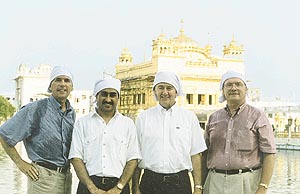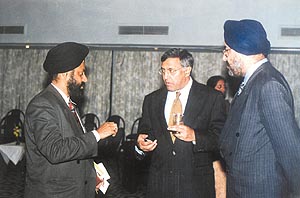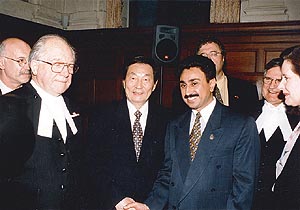May 6, 2000: Tribune of India reports on the progress of Indo-Canadians in Canadian politics
TAKING CENTRE STAGE
Indo-Canadian politicians have spent many years in establishing their credibility at the community level, and now, on the basis of their track record, they are getting voter support to move on to the provincial and federal stage. Theirs, says Prabhjot Singh, is a success story which every immigrant community across the globe should emulate.
"IMMIGRANTS from South Asia take more interest in politics back home than flex their political sinews in the new countries of their domicile. They, somehow, do not get assimilated in their new political environs." This observation, made by one of the scholars-cum-writers on the Indian diaspora about 20 years ago, now needs to be revised.
The Indo-Canadians made a dent in the political scenario of the province of British Columbia in Canada in the early 80s when they sent Moe Sihota to the state legislature as an elected MLA on the New Democratic Party ticket. Sihota later became a minister. The Indo-Canadian community, especially Punjabis, have, since then, not looked back.
 For the Indo-Canadian community, the 1990 Calgary Convention of the Liberal Party, leading to the election of Jean Chretien as its leader, was a milestone, for it formed a solid, loyal voting block for the future Prime Minister of Canada. It was the first time the community organised itself as a political force.
For the Indo-Canadian community, the 1990 Calgary Convention of the Liberal Party, leading to the election of Jean Chretien as its leader, was a milestone, for it formed a solid, loyal voting block for the future Prime Minister of Canada. It was the first time the community organised itself as a political force.Now 10 years later, the Indo-Canadian community not only boasts of the first Indo-Canadian Premier of British Columbia in Ujjal Dosanjh but it also has Herb Dhaliwal as Federal Minister of Fisheries and Oceans; Gurbax Malhi, the first turbaned Sikh, as Member of the House of Commons for the second successive term; and four Reform — the main Opposition party — MPs in Deepak Obhrai, Keith Martin (Anglo-Indian), Gurmant Singh Grewal and Rahim Jaffer.
At the provincial level, the ruling National Democratic Party in British Columbia has, besides Premier Ujjal Dosanjh, Moe Sihota and Harry Lalli as legislators. In Alberta, Raj Pannu represents the NDP in the Provincial Assembly.
In Ontario, Raminder Gill, who represents the Conservative Party, is also a Member of the Provincial Parliament.
Though the emergence of this new phenomenon of ethno-politics in Canada is linked more to the election of three Indo-Canadians to the House of Commons in 1993 — Herb Dhaliwal, Gurbax Singh Malhi and Jag Bhaduria — it has been gradually gaining ground to what the Canadian media has described as the apna factor, symbolising a movement that is gaining strength using the "block voting" technique.
Deepak Obhrai, who won from Calgary East, attributes the influence of the Indo-Canadian community to a passion for politics that is rooted in a movement that led to India's Independence from Britain in 1947.
It is pertinent to mention here that Kamagatamaru or the Ghadar Movement, too, took off from the shores of British Columbia in Canada. The then Indo-Canadians or Indian immigrants worked as lumberjacks and participated in development projects, before getting together and heading homewards to get their motherland freed.
Obhrai holds that the freedom movement galvanised the whole nation as every cross-section of society was involved. It infused Indians with an intense interest in politics that is still palpable in the Indo-Canadian community, which has been called the "most politically active ethnic group in Canada now."
Interestingly, the Indo-Canadian community has supported the NDPin British Columbia in provincial elections. It has also ensured that Herb Dhaliwal retains his seat in the House of Commons as a Liberal. In Alberta, the Indo-Canadian community, though small in number, elected more Reform MPs. In Ontario, they went with Liberals in Federal elections and have now elected Raminder Gill as their MPP from the Conservative Party.
That diversity of view is seen at the elected level, where there are MPPs or MPs with the Reform, Liberals, NDP and Conservative parties.

Gurbax Malhi attributes the success of Indo-Canadian politicians to timing rather than to the apna factor. He maintains that Indo-Canadian politicians have spent many years in establishing their credibility at the community level, and now on the basis of their track record, they are getting widespread voter support to jump to the provincial or federal stage.
Gurmant Singh Grewal, who took the shortest time after his immigration to Canada to reach the House of Commons, feels concerned about the involvement of places of worship in the political process.
Grewal, now Deputy leader of the Reform Party in the Canadian Parliament, has even brought the leader of his party, Preston Manning, and two other MPs, on a tour of India and Punjab.
As a parliamentarian and a Reform leader, Grewal has unprecedented exposure at the international level. He has been to Palestine on a peace-making mission, as well as to China, the United Nations, and Bosnia.
If we look at the background of these successful Indo-Canadian politicians, Ujjal Dosanjh is a professional lawyer; Gurmant Grewal an MBA; Raminder Gill is from the travel trade; Herb Dhaliwal is a businessman, while both Deepak Obhrai and Rahim Jaffer are qualified professionals. Gurbax Malhi has been into real estate, a profession in which Indo-Candians have done exceedingly well in Canada.
Besides these successful Indo-Canadian politicians, there are others who just missed making it to Federal Parliament or the House of Commons or state legislatures. For example, Palbinder Shergill, a young amritdhari Sikh woman and a practising lawyer, was one of the two unsuccessful Punjabi Indo-Canadian candidates in the Surrey Central constituency. The other Punjabi candidate was Charan Gill.
Charan Gill had earlier made an attempt to get into the House of Commons in 1988 but was defeated by Benno Friesen of the PC. He represented the NDP. Palbinder Shergill of the ruling Liberal Party has been very active in criminal and administrative litigation, representing injured workers, disadvantaged youth, women seeking legal protection, besides often providing free legal aid.
Fortythree-year-old Gurmant Grewal, who within six years of his arrival in Canada was elected to the House of Commons, is a product of Punjab Agriculture University, Ludhiana, from where he did his B.Sc. (honours) in agriculture in 1979. He moved to Liberia, where he took up teaching assignments as assistant professor of management. Charan Gill is Hong-Kong born and is a postgraduate in Punjabi language from Panjab University.
Rahim Jaffer of Reforms is a Uganda-born Indo-Canadian whose family left Africa to avoid persecution in Uganda after Idi Amin’s government confiscated their business and home. He worked as a legislative assistant in Ottawa and is now running his business. He is perhaps the only bachelor from the Indo-Canadian community to be elected to the House of Commons. He will turn 29 in December this year.
 The Bramlea-Gore-Malton constituency is definitely dominated by Punjabi immigrants. The first attempt by Punjabis to get into the House of Commons was in 1988, when the Liberals put up Gurjit Grewal, who lost narrowly by 2,185 votes to Harry Chadwik of the CP. In 1993 and again in 1997, Gurbax Malhi wrested this seat for the Liberals. Fiftyone-year-old Gurbax Malhi faced another Indian, Abdul Majeed of the NDP, in the 1997 elections. A graduate from Panjab University, Malhi had moved to Canada in 1975. He has been one of those Members of the House of Commons who has been instrumental in organising the akhand path of Sri Guru Granth Sahib inside the House of Commons to mark tercentenary of the birth of the Khalsa. Canada released a commemorative stamp to mark the occasion. Malhi often gets resolutions passed by the House of Commons on occasions like the birth anniversaries of Sikh Gurus and festivals such as Baisakhi.
The Bramlea-Gore-Malton constituency is definitely dominated by Punjabi immigrants. The first attempt by Punjabis to get into the House of Commons was in 1988, when the Liberals put up Gurjit Grewal, who lost narrowly by 2,185 votes to Harry Chadwik of the CP. In 1993 and again in 1997, Gurbax Malhi wrested this seat for the Liberals. Fiftyone-year-old Gurbax Malhi faced another Indian, Abdul Majeed of the NDP, in the 1997 elections. A graduate from Panjab University, Malhi had moved to Canada in 1975. He has been one of those Members of the House of Commons who has been instrumental in organising the akhand path of Sri Guru Granth Sahib inside the House of Commons to mark tercentenary of the birth of the Khalsa. Canada released a commemorative stamp to mark the occasion. Malhi often gets resolutions passed by the House of Commons on occasions like the birth anniversaries of Sikh Gurus and festivals such as Baisakhi.Deepak Obhrai comes from Calgary East, which in 1988 had tried to elect Anil Giga, a Liberal, to the House of Commons. He, however, was defeated by Alex Kindy by 18,227 votes. At 50, he is also the president of the Hindu Society of Calgary and has been a successful businessman after stints as an air traffic controller and an accounts assistant.
Markham, a suburb of Toronto, which in 1993 had returned Jag Bhaduria, a young Rajput to the House of Commons on a Liberal ticket, saw two other Indo-Canadians in the fray in 1997. Jag Bhaduria contested as an Independent, while Liberals put up Gobinder Randhawa, a young hockey player from Batala, and Bhanu Gaunt. The seat was wrested by Jim Jones, a senior executive of the IBM.
Whatever be the party loyalities, the Indo-Canadian community has come to stay. The community has political recognition and has given a good account of itself in the past 12 years of national politics, and a little longer in provincial politics.
The assimilation of the Indian community in the mainstream politics is nearly complete. This can be judged from the turnout of Indian immigrants to fund-raising dinners and fight for party nominations in various elections, including those to the party positions, for provincial parliaments and the House of Commons. It will not be right to attribute the success of these Indo-Canadian politicians to the whole-hearted support of the Indian community alone. In some of the constituencies (they call it Ridings in Canada), the percentage of voters of Indian origin may not even be in double figures. Still, by virtue of their community work and their involvement in voluntary movement and other socio-cultural projects, these Indo-Canadians have made a mark for themselves.
Of late, because of the sanctions imposed by the Canadian Government after India carried out its nuclear tests at Pokhran, these Indo-Canadian politicians have not been able to make as frequent visits to their motherland as they used to earlier. But relations between the two countries are gradually improving.
Gurmant Grewal of the Reforms Party has been successful in bringing the main leader of the Opposition and the leader of his party and other senior party functionaries to India. He accompanied them to Chandigarh and Amritsar, besides ensuring that they meet national leaders in the Capital. In fact, these new political forces are acting as a bridge between India and Canada in improving bilateral, trade and economic relations.
